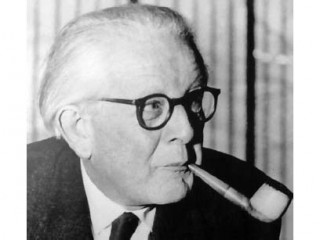
Piaget Jean biography
Date of birth : 1896-08-09
Date of death : 1980-09-16
Birthplace : Neuchâtel, Switzerland
Nationality : Swiss
Category : Science and Technology
Last modified : 2010-05-21
Credited as : Psychologist and philosopher, Natural Sciences,
Even as a young boy, Jean Piaget studied his surroundings. At age eleven, he published his first paper about the natural world. As he grew, his interests steered from the world around him to philosophy and later to psychology. With his work in cognitive development, he has laid a lasting foundation that has played significant roles in the fields of education, reasoning, and even artificial intelligence.
Born to a father who was a professor of medieval literature at the University of Neuchatel, he received an excellent education. When he was young, he was encouraged to explore the environment, where he became infatuated with mollusks, birds, and other animals. He studied at his father’s university and received his PhD in natural science. He also did some studying and work at the University of Zurich, in the German-speaking region of Switzerland. Around this time, he became intrigued with the emerging studies of psychoanalysis. His focus began turning from the natural world to the world inside the human mind. As he furthered his own research in the area, fueled by the debates of the time, he decided that what happened in children’s early lives would affect their later cognitive development.
Jean Piaget came up with his theories especially while he worked with Alfred Binet, who was running an all-boys’ school and who was developing his now famous Binet Intelligence Test. Piaget noticed on the results from the exams that the younger children all gave the same wrong answers. He began pondering the possibilities and decided that children and adolescents think differently. Piaget attributed this to stages of cognitive development, or stages of reasoning. He would later theorize that these stages were partially independent of environment – that the development of reasoning occurred in stages that closely correlated with age.
Piaget then simplified his theories to fall into four categories of development. While these were groundbreaking for his time, these cognitive development stages have been found to occur in the order he prescribed. However, the ages at which these stages occur are not exact. He stated, after researching and watching his own children's developments, that the first years are where one learns sensory-motor awareness; objects are real and children have a full experience of the senses. The next stage, from around the age of two to seven, is the development of motor skills. Following, children from the ages of seven to twelve begin to think logically about concrete events. And finally, the formal operational stage is where children begin to develop abstract reasoning. Jean Piaget was able to give psychoanalysis and theory new depths of understanding about the development of reasoning and most importantly, cognition. Nowadays his work is being used to expand the fields of artificial intelligence – where robots will develop cognitive abilities in a similar step-by-step pattern.
Super-Classics
* Piaget, J., and Inhelder, B. (1967). The Child's Conception of Space. New York: W.W. Norton.
* Piaget, J. (1983). Piaget's theory. In P. Mussen (ed.). Handbook of Child Psychology. 4th edition. Vol. 1. New York: Wiley.
* Piaget, J. (1952). The Child's Conception of Number. London: Routledge and Kegan Paul.
* Piaget, J. (1970). Structuralism. New York: Harper & Row.
* Genetic epistemology
* The early growth of logic in the child
* The origin of intelligence in the child
Major Works
* Piaget, J. (1971). Biology and Knowledge. Chicago: University of Chicago Press.
* Science of education and the psychology of the child
* The child's conception of physical causality
* Intellectual evolution from adolescence to adulthood
* Six psychological studies
* Piaget, J. (1985). The Equilibration of Cognitive Structures: The Central Problem of Intellectual Development. Chicago: University of Chicago Press. (New translation of The Development of Thought)
* Child's Conception of Geometry
* Development and learning
* To understand is to invent: The future of education
* The development of thought: Equilibration of cognitive structures (see Equilibration of Cognitive Structures)
* Language and learning: the debate between Jean Piaget and Noam Chomsky
* The Principles of Genetic Epistemology
Works of Significance
* Piaget, J. (1977). The Grasp of Consciousness: Action and concept in the young child. London: Routledge and Kegan Paul.
* Piaget, J. (1955). The Child's Construction of Reality. London: Routledge and Kegan Paul.
* The mechanisms of perception
* Piaget, J. (1972). Psychology and Epistemology: Towards a Theory of Knowledge. Harmondsworth: Penguin.
* The child's conception of time
* Piaget, J. (1953). Logic and Psychology. Manchester: Manchester University Press.
* Memory and intelligence
* Piaget, J. (1975). The Origin of the Idea of Chance in Children. London: Routledge and Kegan Paul.
* Mental imagery in the child
* Piaget, J. (1981). Intelligence and Affectivity. Their Relationship during Child Development. Palo Alto: Annual Reviews.
* Piaget, J., and Garcia, R. (1989). Psychogenesis and the History of Science. New York: Columbia University Press.
* Beth, E. W., and Piaget, J. (1966). Mathematical Epistemology and Psychology. Dordrecht: D. Reidel.
* The growth of the mind
















